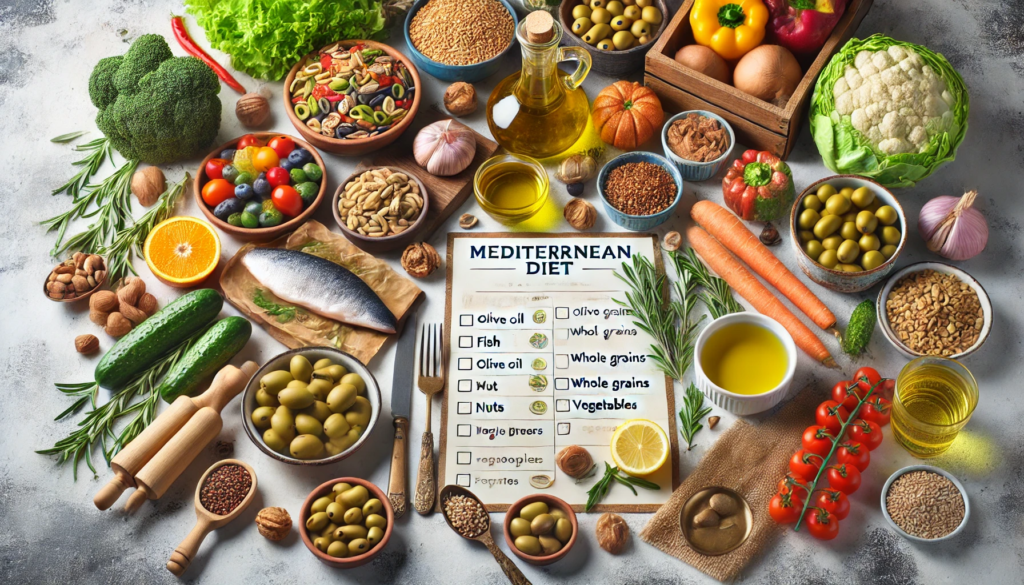
Top 20 Tips for Following a Mediterranean Diet
The Mediterranean diet is a heart-healthy eating pattern based on the traditional foods and cooking styles of countries bordering the Mediterranean Sea. It emphasizes whole, nutrient-dense foods, healthy fats, and lean proteins. Here are 20 tips for beginners to help you get started with the Mediterranean diet.
1. Prioritize Plant-Based Foods
The foundation of the Mediterranean diet is plant-based foods such as vegetables, fruits, whole grains, legumes, and nuts. These nutrient-dense foods provide essential vitamins, minerals, and fiber. Aim to fill most of your plate with these ingredients.
2. Use Olive Oil as Your Main Fat Source
Olive oil is a key component of the Mediterranean diet, known for its heart-healthy monounsaturated fats. Use it as your primary cooking oil and for salad dressings instead of butter or other saturated fats.
3. Eat Fish and Seafood Regularly
Incorporate fish and seafood into your meals at least twice a week. Fatty fish like salmon, mackerel, and sardines are rich in omega-3 fatty acids, which support heart health.
4. Limit Red Meat
Red meat is consumed sparingly on the Mediterranean diet. When you do eat it, choose lean cuts and limit intake to a few times per month. Focus more on lean proteins like fish, poultry, and legumes.
5. Include Whole Grains
Choose whole grains such as oats, brown rice, quinoa, and whole wheat over refined grains. Whole grains are higher in fiber and nutrients, promoting better digestion and overall health.
6. Enjoy Dairy in Moderation
Opt for small amounts of cheese and yogurt, which are common in the Mediterranean diet. Choose full-fat options for better satiety and fewer additives. Greek yogurt is a particularly nutritious choice due to its higher protein content.
7. Eat Plenty of Fruits and Vegetables
Aim to include a variety of colorful fruits and vegetables in every meal. They provide essential vitamins, minerals, and antioxidants that support overall health and reduce the risk of chronic diseases.
8. Snack on Nuts and Seeds
Nuts and seeds are nutrient-dense and contain healthy fats, protein, and fiber. Snack on a handful of almonds, walnuts, or sunflower seeds, or add them to salads and yogurt for extra nutrition.
9. Season with Herbs and Spices
Enhance the flavor of your dishes with herbs and spices like basil, oregano, thyme, and garlic. This adds taste without the need for extra salt and provides additional health benefits.
10. Drink Red Wine in Moderation
If you drink alcohol, consider having a glass of red wine with meals. Red wine contains antioxidants, such as resveratrol, which may offer heart health benefits. Limit consumption to one glass per day for women and two for men.
11. Hydrate with Water
Make water your go-to beverage. The Mediterranean diet emphasizes hydration with water rather than sugary drinks or sodas. Herbal teas and coffee in moderation are also allowed.
12. Choose Lean Proteins
In addition to fish, include other lean protein sources like poultry, eggs, and legumes. These options provide essential amino acids without the saturated fats found in red meats.
13. Focus on Social and Family Meals
The Mediterranean lifestyle values social connections and shared meals. Make mealtime a communal activity to enjoy food and company together, which can also help you eat more mindfully.
14. Limit Processed Foods
Avoid processed and packaged foods that are high in added sugars, unhealthy fats, and preservatives. The Mediterranean diet focuses on whole, minimally processed foods for better health.
15. Practice Portion Control
Even when eating healthy foods, it’s important to be mindful of portion sizes. Eating slowly and savoring each bite can help you recognize when you’re full and prevent overeating.
16. Make Vegetables the Star of Your Meal
Instead of treating meat as the main course, center your meals around vegetables. Add variety with different preparation methods, such as roasting, grilling, or sautéing.
17. Try Meatless Meals
Incorporate meatless meals regularly, using legumes, whole grains, and vegetables as the main protein sources. Dishes like lentil soup, chickpea salads, or vegetable stir-fries are great options.
18. Include Healthy Fats Daily
Healthy fats from sources like olive oil, avocados, nuts, and seeds are encouraged. These fats help absorb fat-soluble vitamins and support heart health.
19. Embrace a Balanced Approach
The Mediterranean diet isn’t about strict rules but rather a balanced approach to eating. Allow yourself occasional treats in moderation, and focus on overall lifestyle habits.
20. Educate Yourself About Food Quality
Opt for organic, locally-sourced, or sustainably-produced foods when possible. This not only supports a healthy diet but also aligns with the Mediterranean lifestyle’s emphasis on quality and sustainability.
Conclusion
Following the Mediterranean diet can improve heart health, support weight management, and enhance overall well-being. By incorporating these 20 tips into your routine, you can embrace a nutritious and balanced approach to eating. Focus on whole, plant-based foods, enjoy lean proteins, and use olive oil as your primary fat source to reap the many benefits of this diet.
FAQ: Mediterranean Diet Tips
1. What is the Mediterranean diet?
The Mediterranean diet is a heart-healthy eating pattern based on the traditional foods and lifestyle of countries bordering the Mediterranean Sea. It emphasizes whole, minimally processed foods such as fruits, vegetables, whole grains, nuts, seeds, fish, and healthy fats like olive oil.
2. Can the Mediterranean diet help with weight loss?
Yes, the Mediterranean diet can support weight loss by promoting the consumption of nutrient-dense, whole foods while reducing the intake of processed foods and added sugars. The diet’s emphasis on healthy fats and fiber can help keep you full and satisfied, making it easier to manage calorie intake.
3. How often should I eat fish on the Mediterranean diet?
It’s recommended to eat fish and seafood at least twice a week, with a focus on fatty fish like salmon, mackerel, sardines, and tuna, which are rich in omega-3 fatty acids that support heart health.
4. Can I eat dairy on the Mediterranean diet?
Yes, dairy is included but in moderation. Choose nutrient-rich options like yogurt and cheese, which are common in Mediterranean cuisine. Full-fat, minimally processed dairy products are preferred.
5. What should I avoid on the Mediterranean diet?
Limit or avoid:
- Processed foods and snacks with added sugars
- Refined grains like white bread and pasta
- Sugary drinks and sodas
- Red meat (consume sparingly) Focus on whole, natural foods for optimal benefits.
6. Is it necessary to drink red wine on the Mediterranean diet?
No, red wine is optional. While moderate red wine consumption can offer heart health benefits due to its antioxidant content, it is not essential for following the diet. If you don’t drink alcohol, water, herbal tea, and coffee are suitable alternatives.











